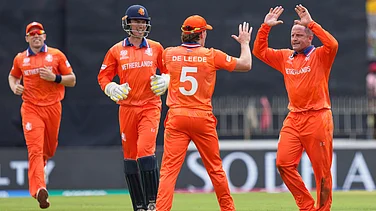Rajnikant flicks the cigarette up in the air and fires a bullet at it. That’s the way he lights his smoke in one of his 150 films. In another flick, he puts a knife in the line of fire which splits the bullet into two (after hitting the dagger point) and hits the two men equidistantly flanking him. In the event of a disproportionate number of extras attacking him, he stays in the air for over a minute and kicks them all very hard.
The former Bangalore bus conductor is one of the most enduring success stories in perhaps the only country (Japan aside, that is) where he may have been asked to act. In real life, it is believed, such a man cannot efficiently either light a cigarette or keep his stalkers at bay.
The argument here is that in cricket it’s possible, though with a somewhat kinder conformation to physics. In a sense, that’s the way India has played most of its international cricket. More importantly, it’s the only way it has been possible for this country not just to play cricket but also conduct public life. Spectacular heroes carrying the burden of other very ordinary men. That’s why for a nation that has lost more matches than it has won, it has a long list of all-time greats. Now, a new-age suggestion is that the reason why India may not win the World Cup is because it doesn’t play as a team. This presupposes that cricket is a team sport. That’s one of the most stunning bullshits of our times.
It’s a world that talks about patriotism and also world peace. It takes such a rational world to first invent a game where the contest is essentially between two men as others just stand, and sometimes in the first slip, sleep, then call cricket a team sport. If fielding is included now as a fine art, it’s because of a superhuman called Jonty Rhodes and other subsequent contenders for that title who are duly recognised for their special ability as individuals. When a team is said to be a good fielding side, it usually is a euphemism for a bad batting line-up or as a reference to one or two good bowlers and an equal number of good fielders. They are all individual units who mathematically constitute what is merely defined as a team.
If Clive Lloyd’s West Indies is said to be one of the greatest sides ever, it’s only because exceptional men played in it. If you want to know what God thinks of those who have been considered alien to ‘team spirit’, look at some of the names he has given them. Sir Donald Bradman, Geoffrey Boycott, Brian Lara, Sunil Gavaskar. Bradman has been openly accused by teammate Keith Miller of stealing a single or a three off the last ball of the over to keep the strike. Not many besides his mum liked Boycott. Brian Lara has been variously described as "arrogant" and "moody". Viv Richards too had what is called disciplinary problems. Yet these are men who have led their teams to victory. Like Rajnikant, they could accomplish tasks that seemed beyond the extras.
‘Strategy’ is another exaggerated cricketing term. Beyond setting the field, deciding the batting order and an intelligent change of bowlers, the game again comes down to the duel between the bat and the ball. People who say cricket is like chess do not play one of the two games.
So why has ‘team effort’ become a popular virtue? The answer is unpleasant. An overwhelming majority of people in this world, as the laws of probability suggest, are not exceptionally talented. ‘Team work’ reassuringly tells the less gifted that the battle cannot be won without them. It’s an appealing concept for most of us. But in cricket it’s inferior to sheer ruthless talent.
That’s the virtue this Indian batting line-up has. Once more the heroes have to go out there and win the World Cup for us. We will carry a team (including a tourist called Parthiv Patel on half ticket) but deep down we all know it will be the stars who go out with the flag. There is nothing wrong with this approach. That’s the way we play our cricket. So what we should worry about is not whether we play as a team—whatever that means—but whether these famous men will fail, as they normally do, all on the same day.
If Rajnikant dies, he would look silly, particularly if he has tried to divide a bullet into two equal halves with a dagger. That’s why he makes sure that it never happens. But in cricket, decisions regarding the script rests with someone else. So if Sachin has gone for a strange shot as in the NatWest final and got bowled, he cannot ask for a retake. If he had connected bat to ball that day the commentator would have said, "what an improvisation". But he didn’t and it looked like a silly demise. The superhero had failed though that day rescue eventually came from unexpected quarters. It’s in the nature of heroes to be flamboyant and seemingly suicidal. That’s why they are interesting to watch.
Since the dependence on heroes comes with the risk of their failing at the time of asking, the Indian team is unpredictable. It’s simple. There is no great mystery here. This explains an interesting character of the Indian performance in one-day cricket. We should call it the Sixth Match Syndrome, which is a condition by which India will win a particular number of matches in a row and then lose the next one no matter which country it plays because it has to respond to its natural instinct to be inconsistent. I call it the Sixth Match Syndrome because India most never wins more than five matches in a row in a single tournament. That has happened only twice. This is not a team that will win all the matches it plays in a World Cup. There will be, what has to be called, human failure. It really doesn’t matter if it’s Australia or the West Indies; what matters is how many matches India has won in a row—that will decide the result of the next match.
Theoretically, on current form India can win the World Cup without winning more than five matches in a row. India plays Holland first which it should win even if the heroes fail. Assuming India loses the next match to Australia, it has to win the remaining four matches in a row to be fully secured of a Super Six group. This is not beyond this team. Then, assuming South Africa has topped Pool B, India will play for its fifth successive win against the hosts. If India wins, it will only be the third time it has won five matches in a row. If India loses (through a highly probable computation, it can lose to either Sri Lanka or New Zealand/West Indies), it can still win the next match to enter the semis. Then it has to win just two matches in a row. That the two matches are called semi-final and final is merely of semantic importance. Not impossible. The reason for giving this model is to just say that Indian inconsistency has never depended on who the opposition is. Merely on its Sixth Match Syndrome. The way this World Cup is drawn, India has a very good chance of winning the Cup even if it is inconsistent. And of course, if it doesn’t play as "a team".


























